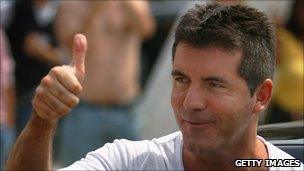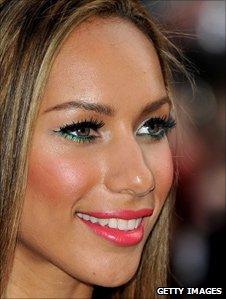The X Factor takes on the world
- Published
Matt Cardle wins The X Factor: Clip courtesy of The X Factor, Talkback Thames/Syco
This morning, as janitors sweep the sweat and glitter off a deserted stage in north London, Matt Cardle is celebrating his X Factor victory.
The 27-year-old former painter-decorator is now practically guaranteed a number one single with his debut release, a cover of Biffy Clyro's Many of Horror.
The ITV1 talent search has produced 45 Top 40 singles across its seven-year span - a figure that can only increase when it launches in the US next year.
Some critics accuse Simon Cowell of having his cake and eating it. Others claim he also chooses the ingredients and owns the bakery, getting paid at every stage of the process.
Damon Albarn, frontman of Gorillaz and Blur, leads the charge. The X Factor, he says, is a "karaoke colosseum" which is actually an advert "for one record label".
"The thing I find incredible is that Simon Cowell gets paid an enormous amount of money to promote his own acts," agrees Mat Osman of Britpop band Suede.
"It just seems to be the greatest con of all time. He should surely be paying a fortune to put these crappy acts on primetime TV.
"But well done to him," he continues. "It's a genius scam."

Simon Cowell's £165m talent show fortune makes him the UK's 11th richest music millionaire
The X Factor isn't exclusively tied to Sony Music, the company that distributes Cowell's SyCo label.
This weekend's final included appearances from Rihanna and Robbie Williams, who are both signed with other companies.
Nonetheless, many musicians have misgivings about the show's impact.
Chart-topping soul star Seal - who has appeared as a mentor on various X Factor franchises around the world - admits "it can homogenise the industry".
"I don't think you can have a superstar by committee," he explains. "There has to be a healthy amount of mystique, if you like, or distance.
"Superstars represent dreams and aspirations for young people. I think, in order to maintain that, there has to be this feeling of reaching."
"The charts are being filled up with people who haven't really understood what it is to be an artist," says Madness frontman Suggs.
"It leaves less room for people who are trying to struggle their way around pubs and clubs and make it to the top in a more organic fashion."
The X Factor's apparent disinclination to nurture creative talent seems to be many people's chief concern.
"I'm not interested in how well someone can sing," says Bernard Sumner of New Order. "It's what you're singing that interests me.
"And what they're singing on X Factor is just other people's music. It's not creative."
Putting the case for the defence is rock legend Alice Cooper, who says: "The advantage The X Factor has is that it's not exclusive.
"On American Idol they want a certain look, a certain sound. A cookie cutter singer who can sing Barry Manilow and Elvis Presley.
"The X Factor's more refreshing. They're wide open - if you're really unique at something, bring it in and, if it's really professional, [they] will go with it."
"If Bob Dylan showed up on X Factor," he muses, "I think he might win."
Pressure cooker
Given the show's pedigree - remember Chico? - it seems unlikely it will ever produce an artist with as much to say about their generation as Dylan.
Yet the contestants can at least provide a unique perspective on the workings of fame.
Diana Vickers, now a chart star in her own right, was caught up in the X Factor media maelstrom and describes her time on the show as "petrifying".
"I was on that stage, and I wanted to be there, and I really wanted to enjoy it," she remembers.
"But sometimes it was so hard, because I was so little and so nervous."
Pop duo Hurts witnessed the carnage up close when they appeared on The Xtra Factor, The X Factor's spin-off show, in November.
"It freaked me out," says singer Theo Hutchcraft. "It's like a circus.
"There's cheerleaders running around, there's people on skateboards, and then there's these people - the contestants - sat alone. They don't really talk to each other."
"It's massively dangerous," he says of the show's make-or-break format. "The tension's just so high.
"It's almost like going to the underworld. Because the only outcome is only very good or very bad."
Paul Weller is worried too. He feels the new generation of musicians, having been primed by The X Factor, aren't prepared for the long, arduous slog of a career in music.
"It's not like people are going to jump in a transit van and play the clubs for five years, learn the ropes and do their apprenticeship," says the former Jam man.
"A lot of people might think that's a drag, but it's really important. You learn an awful lot, and those things stand you in good stead and help you endure."
JLS disagree. They placed second in 2008's X Factor, using it as a platform to launch a sound and a brand they'd been working on for years.
"It's a huge opportunity that's put on the table," says Jonathan 'JB' Gill. "If you make the most of it, you can definitely go on to bigger and better things."
Although the boy band chose not to work directly with Cowell after the competition, Oritse Williams insists he was "still a great help".
Indeed, Cowell has invited JLS to appear in front of The X Factor's 14 million-strong audience three times in the last two years.
'No stranglehold'
Disco queen Alison Goldfrapp says she watches the show through her fingers, cringing at the "smug" expression on Cowell's face.
"But if he phoned me up and asked me to come on the show? For a million, trillion pounds I'd say yes!" she cackles.
"I don't know if I could cope with teaching them to sing, though. They can learn it themselves."

X Factor winner Leona Lewis sold 1m copies of her debut album in 29 days
So what does the man in the high-waisted trousers make of all this debate, discussion and derision?
"I think it's crazy to say, when you've got 20 million people watching the show and getting interested in music again, that we have a stranglehold," he tells the BBC. "It's ludicrous.
"What we encourage people to do on our show on Sunday is come with a massive budget, performances, dancers, to put on a show.
"If you compare what it looked like a couple of years ago, it was boring. You had to go on GMTV and stand in front of a blanket.
"At least on our show you get to put on a show. It's got people interested again. I think it's really healthy."
"We might be announcing something fairly soon," he says cautiously. "I think there should be another music show."
'Underground reaction'
But even this won't satisfy the doubters. Harking back to the music shows of his childhood, Albarn says: "Anything could appear on Top of the Pops and it wasn't controlled by one group of people.
"The eclecticism Top Of The Pops offered our culture was far more exciting and far more positive."
Yet Suede lead singer Brett Anderson sees one positive in Cowell's dominance.
"When you have a real, awful, stifling mainstream thing like The X Factor, there's always a really strong underground reaction.
"Lots of bands will grow up and make music almost as a reaction against that, and that's a really healthy thing."
Perhaps the most insightful - and damning - assessment of The X Factor comes from underground rap artist Dan Le Sac.
"It simply doesn't matter," he says. "It's fun, it's entertainment.
"I know Joe McElderry won last year, but I couldn't tell you who won the year before. We get rid of it. It recycles itself within a year.
"It may be a horrific thing but if people enjoy it, they should be allowed to. You should be allowed to love the trash as well as the meaningful stuff."
Additional reporting by Mark Savage.
- Published13 December 2010
- Published6 December 2010
- Published6 December 2010